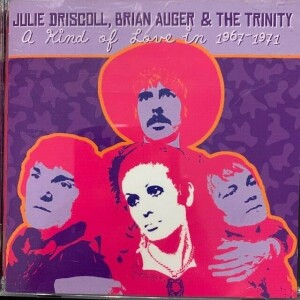 Pianist Brian Auger heard the sound of the Hammond B-3 (as played by Jimmy Smith and Jack McDuff) in 1964, and gave up a promising career in jazz for R&B and the sound of the organ. Guitarist John McLaughlin was briefly a member of Auger’s band. Julie Driscoll was the president of the Yardbirds fan club, and secretary for their manager (Giorgio Gomelsky), when he suggested that she might fit in well with Auger’s trio. And thus was born Brian Auger & the Trinity, with Julie Driscoll.
Pianist Brian Auger heard the sound of the Hammond B-3 (as played by Jimmy Smith and Jack McDuff) in 1964, and gave up a promising career in jazz for R&B and the sound of the organ. Guitarist John McLaughlin was briefly a member of Auger’s band. Julie Driscoll was the president of the Yardbirds fan club, and secretary for their manager (Giorgio Gomelsky), when he suggested that she might fit in well with Auger’s trio. And thus was born Brian Auger & the Trinity, with Julie Driscoll.
This petite Carnaby Street beauty with the big voice fronting the jazzy-bluesy Trinity led to a major Top 40 hit. Bob Dylan’s collection of unreleased songs (the Great White Wonder) was making the rounds, and Julie and Brian selected “This Wheel’s on Fire.” They wrapped her fierce voice in a bed of swirling organ, solid bass from Rick Brown, and the steady beat of Mickey Waller. It’s a bit muddy perhaps, but no one can deny its power. It went to No. 5 in 1968, but Driscoll, Auger and company were never able to recreate the success.
They recorded a couple more albums, and Jools went on to explore more obscure jazz with her new husband Keith Tippets, while Auger kept plugging away, forming new bands like Oblivion Express, and backing Eric Burdon for a time. Auger and Tippets (Driscoll) tried getting back together a couple of times, but their major success came with the original three albums, and that’s what’s here. Gathered by the Australian archivists at Raven Records, A Kind of Love In starts with a pair of early Julie Driscoll solo tracks. Her voice is potent, and the songs are an interesting study in what was going on at the time. The A-side was “I Know You Love Me” a string-backed tune with some electronic noise (is that a theremin?), kettle drums and Jools’ gospel singing; it’s a bit over the top. The B-side is more interesting, an obscure Randy Newman ballad, “If You Should Ever Leave Me,” that is more subtly produced, and allows Driscoll more room to fill. She rides just on the outskirts of pitch, but there’s something compelling about listening to her hang on.
The big hit is here, all funked up. “This Wheel’s On Fire” sounds even better than it did when I first heard it, on AM radio in ’68. It’s a bit like The Band with vocals by … I can’t do it … there’s nobody who would sing it the way Jools did. Wow!
Now, I said that Julie Driscoll, Brian Auger and the Trinity were never able to recreate the success of “Wheel” but they sure did recreate the excitement, and the bulk of this collection is dedicated to proving it. The title track was the B-side to the “Wheel” single. Sounds a bit like the Spencer Davis Group, probably due to the organ lead. Jools sits the next one out as guitarist Gary Boyle and Auger trade solos on a cover of Wes Montgomery’s “In And Out.” The band had changed by now to include Boyle, and a rhythm section of Dave Ambrose (bass) and Clive Thacker (drums). “Black Cat” adds horns and a raving vocal by Auger. Whooo!
The original tunes seem to borrow from contemporary hits, but they are played with ferocity and precision and therefore take on their own textures. Auger’s tunes are riff-based and provide a showcase for his organ playing, and plenty of space for Boyle’s guitar too. Driscoll tries her hand at composing, too. Her lyrics deal with social problems, “A Word About Colour” and her melodies are inventive. The cover versions are marvelous. Lowell Fulsom and Jimmy McCracklin’s “Tramp” is a sexy blues; Donovan’s “Season of the Witch” is given a long workout; and the Staple Singers’ “Why (Am I Treated So Bad)” is as funky as the original. Add to those renditions of David Ackles’ “Road to Cairo,” Richie Havens’ “Indian Rope Man,” the gospel “Take Me To The Water,” and the Doors’ classic “Light My Fire,” each one stamped with Auger’s and Driscoll’s trademarks (the Hammond B-3 plus amazing vocals) and you’ve got a compelling collection of music. Don’t forget the medley from Hair!
The two concluding songs are originals by Julie Driscoll from her 1969 album. “Walk Down” starts off as a quiet abstract rap which turns into a call to rally the troops. Interesting. Finally “A New Awakening” features Chris Spedding providing sizzling lead guitar, and Jools’ remarkable voice. It’s another political song, but weren’t they all in ’69?
Altogether 21 tunes tracing the arc of a band. Drawn from three albums and a handful of singles, A Kind of Love In: 1967-1971 continues Raven’s grand tradition of keeping this kind of great and obscure music available. The liner notes quote Ms. Driscoll from 1968, “Sometimes I think about my job as a pop singer and I wish I could have a go at something really big, like climbing Mount Everest, or being the first woman world driving champion or something. Then I get back to reality and appreciate that it isn’t for me, that I’ve got to be satisfied with what I’m doing right now.” Collections like this let us all appreciate what she was doing, then, and now!
(Raven Records, 2004)
